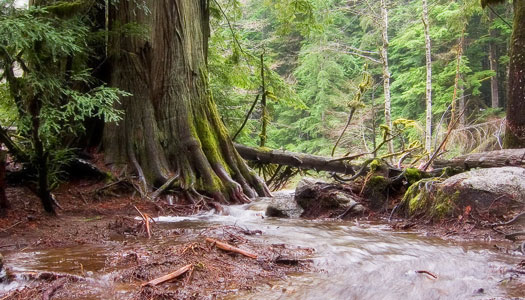“How happy is the man who does not follow the advice of the wicked. . . . He is like a tree planted beside streams of water.” —Psalm 1:1,3
Summer is the perfect time to climb a tree. But if you prefer to keep your feet on the ground, grab a blanket, head outdoors and get ready for a nature walk through God’s Word. The Bible mentions trees nearly 300 times. Again and again, God compares us to trees, growing up under His care. Kids in the early church knew all about cedar, fig, palm, olive and acacia trees. Now you can, too.
Acacia
The acacia symbolizes reverence, or a holy fear of the Lord. God instructed the Israelites to carve the ark of the covenant out of acacia wood (Exodus 25:10-22).
Everything about this tree says, “Stay away!” Its branches are covered with sharp thorns, and its leaves are poisonous. By choosing acacia wood for the box that held the Ten Commandments, God reminded the Israelites to be careful. His holy presence was so powerful that anyone who touched the ark would die.
We don’t have arks anymore; Jesus paid the debt for our sins, which allows us to draw close to Him without fear. But it’s always good to remember that we worship the awesome God who made the universe. He is powerful and there is no foe He can’t defeat.
Cedars
The cedar tree symbolizes strength and magnificence. Kings used it to construct palaces that were meant to last forever. So when Solomon built the Lord’s temple, he chose cedars from Lebanon, the finest wood in the world (1 Kings 5:1-6).
Cedars can grow 130 feet high and can live up to 2,000 years! They survive so long because their wood secretes a fragrant oil that is toxic to insects, fungus and disease. God’s love is like that oil. If we read His Word and let it burrow deep into our “heartwood,” it protects and strengthens us.
Solomon’s temple didn’t stand forever. But with God’s love flowing through us, our impact on those around us can outlast even the mighty cedar.
Palms
The palm frond symbolizes triumph over adversity. When Jesus made the Triumphal Entry into Jerusalem, the crowds rejoiced and laid palm branches at His feet (John 12:12-13).
A welcome sight to the weary traveler, palm trees offer food, shade and the promise of water. But the palm can serve many other purposes as well. Did you know palm fronds can be used to make rope and baskets or that its seeds are food for camels? Every part of the tree is useful and strong. The palm’s roots are able to dig deep underground and search for water, even in the driest places on earth. Jesus is our source of “living water.” He gives us life, no matter what difficulties surround us.
Like the palm tree, we should try to be useful and strong as we tap into Jesus’ living water.
Figs
Although the fig tree produces a delicious fruit, it has been called the “hypocrite tree.” Before His crucifixion, Jesus approached a fig tree, looking for fruit. When He found only leaves, He cursed the tree and it withered (Matthew 21:18-19).
Unlike apples or oranges, figs are green and are not easily detected among the leaves until they are nearly ripe. From a distance, you can’t tell whether a fig tree has any fruit or not. God tells us to bear good fruit—to share His love with others by how we speak and act.
Does our fruit look too much like everyone else, or is it ripe and easy to spot?
Olives
From Genesis to Revelation, the olive tree symbolizes God’s blessings: peace, prosperity, wisdom and honor. Samuel poured olive oil on David’s head to show that God had blessed him (1 Samuel 16:12-13).
Compared to majestic cedars, the olive tree looks small and stubby. But when you crush its fruit, you get olive oil. This remarkable liquid is one of the main ingredients in bread and also fuels oil lamps to light up the night. Even the poorest families (2 Kings 4:2) kept a jar of olive oil in the house. When mixed with fragrant spices, olive oil is used to anoint the heads of priests and kings, dedicating them to lifelong service.
In 2 Corinthians 1:21, it says that God has anointed you and me. We have been blessed like kings, but with that blessing comes the responsibility to serve God with all our hearts.
Respecting the Seasons
One last lesson from the trees: There’s a time to bear fruits and a time to grow roots. Take advantage of the “growing” time to: study the Bible, learn how to pray, memorize worship songs and train yourself to give your money and talents to God. Day by day, let Him grow you into the person He wants you to be.













